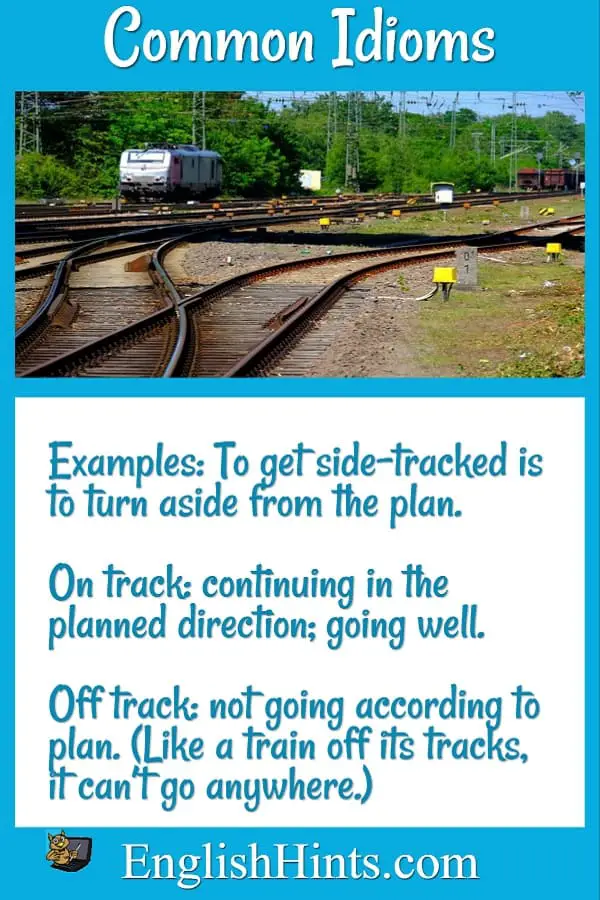Common Idioms:
Understand English Better
Can you understand common idioms? They can be confusing. That's because idioms are groups of words with a meaning different from the meanings of their individual words.
Some are like short proverbs, expressing the experience of generations in a few words.
Others are metaphors, for example comparing a business experience to a baseball game. ("Our team hit a home run on that deal!" or "Be careful! You've already got two strikes against you!" See Sports Idioms.)
Many are phrasal verbs, like 'cut out,' 'get along with,' 'get by,' 'get off,' 'get over,' 'look up,' 'look up to,' 'look down on'-- and so many others. Some are easy to guess, and some are not.
It's worth learning the most common idioms in English since we use them so often. You'll hear them in business settings as well as casual conversation.
Phrasal Verbs
Some of the most common idioms of all are phrasal verbs. Phrasal verbs are verbs followed by a preposition (technically a particle). English speakers use them much more often than the one-word verbs that express the same thought.
(We say ‘keep on’ more often than ‘continue.’ We tell someone, ‘I got over’ a cold-- or a love affair-- rather than ‘I recovered.’ We almost never ‘enter’ cars; we ‘get in.’)
Some phrasal verbs mean what they say: ‘to look up’ can be to fix your eyes on the sky. More often, the meaning of the expression is not the meaning of the individual words. ‘To look up’ usually means to search for a word in a dictionary or other text.
Phrasal Verb Use has a full explanation. It discusses the difference between separable and inseparable phrasal verbs as well. (That's important if you want to use phrasal verbs with pronouns.)

More than half the English idioms listed on this website are phrasal verbs. That's both because they are so common and because they're not always obvious. Most are on List of English Phrasal Verbs, A-M or List of Phrasal Verbs, P-W.
I also offer a free downloadable resource on Common Phrasal Verbs (with a useful alphabetical index, since so many of them have meanings that are hard to guess.) Teachers might be interested in an inexpensive similar workbook with phrasal verb exercises you can use in class.
Some Other Common Idioms
Besides phrasal verbs, there are other types of idioms in English. They are often based on familiar activities or observations.
Many are related to our hearts or other parts of our bodies. "If something costs "an arm and a leg," it's expensive. "He's all thumbs" means he is clumsy.
Other idioms come from human or animal behavior. Some of these, especially those based on proverbs, are obvious, others are not.
EnglishHints concentrates on very common idioms that are less obvious. You can look up colorful, less common idioms (like "raining cats and dogs"-- which means raining hard) online. Just put the phrase or expression you want in a search box.
Examples of common idioms that might not be easy to guess:

- ‘On the same page’ means that people are looking at things from the same point of view. They agree about what to do.
(It refers to a group reading something. They need to be looking at the same page to read together. Example: “O.K. I think we need to concentrate on production now. Are you all on the same page with me?”
- To get ahead means to reach one’s goals, especially in competition with others (as in passing someone in a race.)
- To get a hold of someone (= get in touch with them) is to make contact and talk with someone (especially by phone).
- To get (or keep, or stay) in touch with someone is to establish or maintain communication with them.
- To get it means to understand something. “I get it! You don’t need to keep explaining what happened!”
- To get on someone’s nerves is to annoy or bother someone. (“When my kids fight over every little thing, it really gets on my nerves.”)
- To get side-tracked is to be distracted and to change direction, turning aside from the plan for a project. The expression comes from a time when railroads were very important.
When two trains were using the same track, one would have to move off the main track onto a short area of ‘siding’ to allow the other to go by. The sidetrack did not lead anywhere. The train would need to return to the main track to reach its destination.
(See 'to be on track' and 'to be off track' on List of Idioms.)
More Idioms
You can find a more complete explanation of idioms and their use in English in What is an Idiom?
For an alphabetical list of more common English idioms like these, see List of Idioms. (It explains their meanings and gives examples.)
There's a section on idioms used in politics in the middle of the page on Political Language. As mentioned, there's also a whole page on Sports Idioms.
Practice Using Idioms
After studying these idioms, read some conversations with them in Idiom Examples. (It also shows how to use many phrasal verbs.) Then check your understanding with the exercises on the Phrasal Verb Quiz. Or sign up to get your own free pdf copy of these exercises and many of the examples on the pages above on the Common Phrasal Verbs page.
You can also review phrasal verbs interactively with two Memory or Concentration Games. Memory Game 1 reviews Phrasal Verbs A-L; Memory Game 2 reviews M-Z.
There's a complete explanation of the rules at Concentration Games.
For fun, see if you can guess some common idioms that Shakespeare introduced into English. See Idioms from Shakespeare: a Matching Game.
Didn't find what you
needed? Explain what you want in the search box below.
(For example, cognates, past tense practice, or 'get along with.') Click to see the related pages on EnglishHints.
| site search by freefind | advanced |








